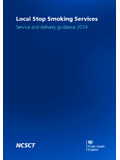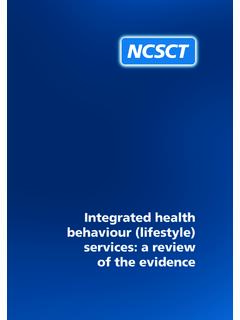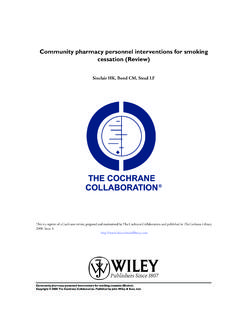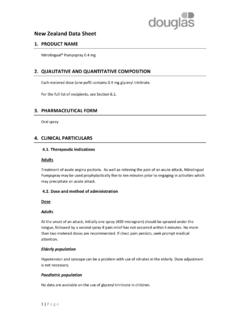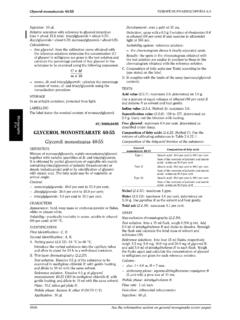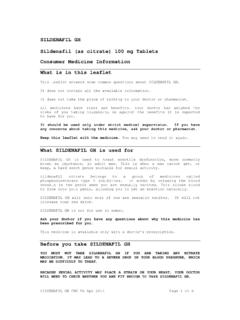Transcription of Helping smokers to stop: guidance for the pharmacist - NCSCT
1 1 Helping smokers to stop: advice for pharmacists in England Hayden McRobbie and Andy McEwen This publication was commissioned by the Health Development Agency (HDA) in collaboration with the Royal Pharmaceutical Society of Great Britain and PharmacyHealthLink, but published after the HDA s functions were transferred to NICE on 1 April 2005. The document aims to support pharmacists and their teams to deliver smoking cessation treatments. The publication does not represent NICE guidance . ISBN 1-84629-035-X National Institute for Health and Clinical Excellence, Royal Pharmaceutical Society of Great Britain and PharmacyHealthLink 2005 2 Contents Introduction the role of pharmacists in Helping people to stop smoking 3 Aims of the document 3 Section 1 Helping smokers to stop 5 Background 5 Brief advice 5 NHS smoking cessation treatment 7 Providing smoking cessation treatment 8 Pharmacotherapies 11 Section 2.
2 Useful information 18 Smoking patterns and prevalence 18 Health risks of smoking 19 Benefits of stopping smoking 21 Why cutting down doesn t work 22 Resources 23 References and bibliography 24 3 Introduction the role of pharmacists in Helping people to stop smoking pharmacists are ideally placed to advise people on how to stop smoking and to provide information on the supply of medication. Many will also be able to provide treatment for smokers who want to stop. The contribution pharmacists can make to improving the health of the population has been recognised in A vision for pharmacy in the new NHS (DH, 2003).
3 It is reflected in The new contractual framework for community pharmacy (DH, 2004; see Box 1) and is outlined in Choosing health through pharmacy: a programme for pharmaceutical public health 2005 2015 (DH, 2005). Community pharmacists see some six million people a day in the UK, and are freely accessible to communities (PSNC, 2004). There are opportunities to intervene with both well and ill visitors to the pharmacy, and therefore to provide both preventive advice and treatment. Smoking cessation fits neatly within this role: all pharmacists will have the opportunity to advise smokers to stop and some pharmacists with specialist training will be able to provide them with treatment.
4 Hospital pharmacists are an integral part of the clinical team, and have specialist clinical roles that include assessing the implementation of the (then) National Institute for Clinical Excellence guidelines on smoking cessation medications (NICE, 2002). Hospital pharmacists have contact with the majority of inpatients, so they are ideally positioned to provide brief smoking cessation advice to smokers . They can also receive training to provide specialist support, for example to NHS staff and long-stay patients. Other pharmacists work in areas where they come into direct contact with the public, such as GP surgeries, care homes and private healthcare facilities.
5 All pharmacists who have direct contact with the public, patients, relatives and carers have a role to play in Helping people to quit smoking. Aims of the document1 This document aims to provide pharmacists with the basic information needed to help smokers to stop. pharmacists who have already received specialist training in smoking cessation and regularly provide treatment for smokers as part of their routine work will find this document useful as it will reinforce that training and experience. For all other pharmacists , this document will provide information and skills to enhance the brief stop smoking advice already delivered to smokers .
6 The document is divided into two sections: Section 1: Helping smokers to stop covers giving brief advice, providing behavioural support and using nicotine replacement therapy (NRT) and bupropion Section 2: Useful information gives some detail on smoking patterns, health risks and the benefits of stopping smoking, and sources of further information. 1 Although this publication is primarily for pharmacists in England, the advice provided should be equally applicable to pharmacists in other parts of the UK. 4 This document is not a substitute for receiving specialist training and building up experience of treating smokers .
7 If you want to help smokers to stop, or if you have any questions or worries about smoking cessation advice or treatment, you should direct them to the local stop smoking service (page 23). Box 1: The new contractual framework for community pharmacy (DH, 2004) The new pharmacy contract brings together the skills and expertise of pharmacists and their staff to deliver a number of services to the community. There are eight essential services that all community pharmacists are expected to provide, plus optional advanced and enhanced services. Smoking cessation falls into three key areas, as follows. (1) Essential service 4: Promotion of healthy lifestyles (public health) The provision of opportunistic advice on lifestyle and public health issues to patients receiving prescriptions and pro-active participation in national/local campaigns, to promote public health messages to general pharmacy visitors during specific targeted campaign periods.
8 (DH, 2004) (2) Essential service 5: Signposting The provision of information to people visiting the pharmacy who require further support, advice or treatment. (DH, 2004) (3) Enhanced services These services will be commissioned locally. Many pharmacists already provide community-based smoking cessation treatment as part of the local NHS stop smoking service. 5 Section 1 Helping smokers to stop Background The primary reason that many smokers find it difficult to stop is their dependence on nicotine. Nicotine is a psychoactive drug that is very addictive, and regular smokers soon become used to the presence of nicotine in their system (RCP, 2000).
9 Stopping smoking usually brings on a withdrawal syndrome comprising a range of symptoms (Box 2). These symptoms, especially urges to smoke, can lead to relapse early in a quit attempt (West et al., 1989a). Most withdrawal symptoms last no longer than two to four weeks (Hughes, 1992; West et al., 1989b), so assisting smokers through the first four weeks is important. Box 2: Tobacco withdrawal symptoms Symptom Average duration Depressed mood <4 weeks Sleep disturbance <2 weeks Irritability <4 weeks Difficulty concentrating <2 weeks Restlessness <4 weeks Increased appetite and increased weight >10 weeks Constipation >4 weeks Mouth ulcers >4 weeks Light-headedness <2 days Urges to smoke >10 weeks Sources: West et al.
10 (1989); Hughes (1992); Hajek et al. (2003); Ussher et al. (2003); McRobbie et al. (2004) Evidence-based NHS stop smoking services were introduced as a national programme in 2000 in an effort to reduce the burden of smoking-related diseases in the UK (DH, 1999). These services are now run by primary care trusts. Many follow a similar structure: a pre-quit appointment for preparation; a quit date after which not even one puff on a cigarette is prescribed; and up to four weekly appointments to four weeks after the quit date. Services encourage the use of NRT and bupropion (Zyban). They generally have two types of intervention: group (clinic) treatment and individual (community) treatment.
![e-cigarettes briefing [ 2 ] v4 - NCSCT](/cache/preview/0/6/5/c/9/3/f/f/thumb-065c93ffb7496a6f7f874369520a6a6d.jpg)



